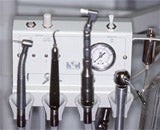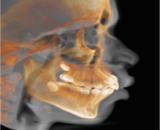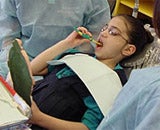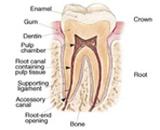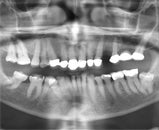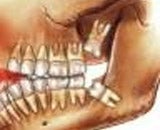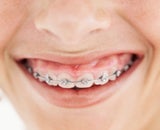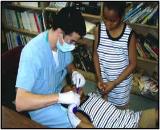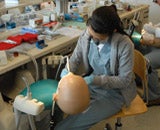Andres Pinto
andres.pinto@case.edu
216.368.6769
Transform Your Future with Advanced Dental Training
At the Case Western Reserve University School of Dental Medicine, our graduate programs are shaping the next generation of leaders in dentistry. Rooted in decades of expertise and energized by innovation, we offer a learning experience that blends tradition, cutting-edge technology, and unmatched clinical opportunities. Our curriculum prepares you to fully engage in clinical practice and clinic/office administration through:
- Personalized Mentorship: Small faculty-to-resident ratios ensure you receive individualized guidance from world-renowned experts.
- Innovative Technology: Experience hands-on training with robotic systems, advanced 3D imaging, AI-driven treatment planning, and laser dentistry.
- Extensive Clinical Experience: Build confidence and skill through robust clinical exposure across diverse healthcare systems.
- Global Connections: Collaborate with leading organizations locally, nationally, and internationally.
The School of Dental Medicine offers a number of post-graduate programs, including residencies and internships. Explore our programs below.
Advanced Education in General Dentistry (AEGD)
Our AEGD program is a one-year experience with a major emphasis in clinical general dentistry designed to provide the resident with training beyond that received in the pre-doctoral curriculum. Formal courses, seminars and literature review, as well as one week of "on call" per month, enhance the resident's ability to handle dental and medical emergencies encountered in everyday practice.
Craniofacial Orthodontics Fellowship
Our Craniofacial, Surgical and Special Care Orthodontics Fellowship Program provides advanced clinical, didactic, and research training during the one-year program of study in the management of children with facial differences. The goal of the Fellowship Program is to train the fellow to attain a level of competency that enables him or her to recognize, diagnose and treat patients with craniofacial anomalies and special needs in a hospital-based, team care setting.
Dental Public Health
The advanced education/residency program in dental public health at Case Western Reserve University (CWRU) has three different tracks to meet different candidate's needs.
- a one-year full-time program for dentists with an accredited master's degree in public health (MPH) or equivalent
- a two-year part-time program for dentists with an accredited master's degree in public health (MPH) or equivalent
- a two-year full-time program for dentists without an MPH or equivalent degree
The program is administered by an experienced program director and a cadre of excellent faculty members. The training program will be tailored to meet each individual resident's career goals and will include didactic curriculum and practical experiences/exercises in: 1) research, 2) program planning, 3) program evaluation, 4) public health administration, 5) teaching, and 6) community-oriented primary care.
Endodontics
The graduate endodontic program is a continuous, two-year Master's degree and Certificate program commencing the beginning of July of each year. It has a full-time director, full-time academic faculty, and part-time clinical faculty members. It is concerned with developing competent, skilled clinicians with teaching and research abilities. To achieve these objectives, the program provides extensive backgrounds in both scientific and clinical knowledge. The CWRU Endodontic residents have presented more research at the annual AAE meeting than any other endodontic graduate program nationally or internationally.
Oral & Maxillofacial Medicine & Diagnostic Sciences (OMMDS)
Oral Medicine is the field of dentistry concerned with the oral health of medically complex patients and with the diagnosis and non-surgical management of medically related disorders or conditions that affect the oral and maxillofacial region. Clinicians trained in oral medicine work closely with other medical and dental specialties to provide the best quality of care using a multidisciplinary approach. The Oral and Maxillofacial Medicine and Diagnostic Sciences department offers a one-year Oral Medicine Internship program, a two-year Oral Medicine MSD program, and a one-year Oral and Maxillofacial Radiology Internship program.
Oral and Maxillofacial Surgery (OMFS)
The Oral and Maxillofacial Surgery residency is a five-year program that strives to provide an educational experience balanced between clinical service and academic endeavors that is sufficiently flexible in scope to meet the individual needs of each trainee. The academic Department of Oral & Maxillofacial Surgery is subdivided into three entities: the Department of Oral & Maxillofacial Surgery at University Hospitals of Cleveland, Clevelands Veterans Administration Hospital, and the School of Dental Medicine at Case Western Reserve University. This three-tier structure ensures that our residents not only gain experience in all of the essential areas of clinical surgery but do so in a varied environment, thereby preparing them for whatever type of practice they choose to enter. Together, the entire faculty is committed to the pursuit of excellence in both the clinical and academic arenas.
To enhance CWRU’s international footprint and improve clinical dental care, the CWRU School of Dental Medicine has embarked upon a program that accepts one dental graduate from a foreign dental school each year. This student would be in addition to the three residents who are already in the existing five-year OMFS program earning an MD. Unlike the five-year OMFS students, this additional student would pursue a non-MD pathway to gain the experience required for an MSD and a certificate.
Orthodontics
The clinical training of orthodontic residents encompasses all aspects of current orthodontic practice including teenage clinic, early treatment, adult treatment, craniofacial anomalies, and orthognathic surgery. The length of the orthodontic program is a minimum of 30 months. The clinical load of patients is chosen to match the teaching goals of the department. There is an option to extend the program to 36 months. The 36-month option satisfies the European specialty training standards (ERASMUS).
Pediatric Dentistry
Postgraduate study in Pediatric Dentistry is an intense educational experience. Our two-year post-doctoral residency program follows closely the principles and policies as outlined in the Guidelines for Advanced Education in Pediatric Dentistry prepared by the American Academy of Pediatric Dentistry and the American Board of Pediatric Dentistry. It is fully accredited by the Commission on Dental Accreditation. Successful completion results in a certificate of specialty education in pediatric dentistry which qualifies the resident for examination by the American Board of Pediatric Dentistry. There is also an option for students to receive the M.S.D. Students who elect to complete the Master's program pay full tuition. The M.S.D. program is open to non-U.S. citizens and foreign-trained dentists. The pediatric dentistry curriculum is designed to have the resident play an integral role in the health care of children, side by side with his/her medical colleagues, and to prepare the resident for successful entry into the contemporary practice setting while providing the foundation for future growth in the field.
Periodontics
The periodontics graduate program is a three-year continuous course of study leading to both a certificate in Periodontics and a Master of Science in Dentistry degree. It is fully-accredited by the American Dental Association and meets all the clinical and didactic requirements of the American Board of Periodontology. The general goals of the program are to train expert clinicians in this specialty, and/or to prepare individuals for an academic (research-teaching) career in Periodontics. Completion and defense of a research thesis is one of the requirements of this program. Limited teaching experience is offered to the graduate student so that his/her exposure to clinical, research, and teaching facets of periodontics is complete. Extensive contact with practicing periodontists, sufficient exposure to hospital periodontal practice, and clinical training in dental implants are additional features of this program.


